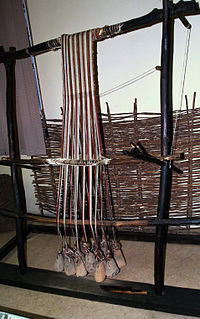Although the ‘technology’ of Ancient Greece consisted of basic weaving devices rather than smartphones, that early civilization had already begun philosophical inquiry into the nature of technology. In fact, our modern word ‘technology’ arises from the Greek root word techne meaning "art, skill, craft"1.

Reconstruction of a warp-weighted loom not unlike the Ancient Greeks would have used.
In those early times, much of the discussion centered around the idea that all technology was in imitation of nature; Democritus suggested that those weaving techniques were learned by watching spiders while Aristotle argued that, while that is sometimes true, "art in some cases completes what nature cannot bring to a finish"2 - a thought which fascinated alchemists in the years to come. Aristotle also drew a distinction between the purposes of natural things and technology, noting that the former possess inner motivation and the ability to reproduce on a self-sustaining level as a species whereas technology is made by external intentions (i.e. those of the human creating it) and without human upkeep, such creations of man would degrade back into their natural elements.
Throughout the ages that followed, various great philosophers have extended and analysed the theories in the philosophy of technology, including Sir Francis Bacon, Earl Kapp, Heidegger and many more3. A mix of optimistic and pessimistic can be found among them and while the modern view of technology tends toward seeing it as a neutral force whose propensity for doing good or doing harm rely on the wielder, the question is still very much up for debate. Another fascinating up-and-coming sub-field is the possibility of Artificial Intelligence and the plethora of moral issues that raises. Whatever comes, our ever-increasing reliance on technology as a species ensures means this area of inquiry can only grow.

Watson, an allegedly artificially intelligent computer built by IBM that beat all the reigning jeopardy champions. [Image credit Paul Hudson]
References:
1. Unknown (e.g. 2011). Technology. [ONLINE] Available at: http://web.engr.oregonstate.edu/~funkk/Technology/technology.html. [Last Accessed 13/2/14].
2. Franssen, Maarten et al. (2009). Philosophy of Technology. [ONLINE] Available at: http://plato.stanford.edu/entries/technology/. [Last Accessed 13/2/14].
3. Reydon, Thomas A.C. (). Philosophy of Technology. [ONLINE] Available at: www.iep.utm.edu/technolo/. [Last Accessed 13/2/14].
© BrainMass Inc. brainmass.com June 30, 2024, 6:59 am ad1c9bdddf